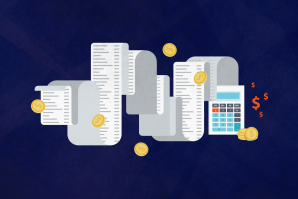Sean Herron is a market director for J.P. Morgan Wealth
Management, focused on the Greater Sacramento and Northern Nevada
regions.

However, reducing expenses during the pandemic doesn’t mean you have to jump back into those same expenses. It’s important to make sure that you’re not overspending and are re-evaluating your budget to fit in line with your financial priorities and overall goals.
Seeing your account balances increase as you save or get a tax refund is exciting, but it’s important to make smart decisions with unexpected money. Here are some ways that you can make the most of extra cash, such as a tax refund:
1. Put a plan on a page
Once you find out whether you’ll be getting a tax refund and how much it will be, the most important step is to map out your plan. If you work with a financial advisor, you might want to start discussing your plan and any changes. It can be tempting to spend all of the money on one big purchase that’s been on your wish list, but be strategic. Consider treating yourself with part of the refund and setting another part aside for savings, either for strengthening your emergency savings fund or investing for retirement.
2. Add to or create your rainy day fund
Creating an emergency fund is critical to investing in your future. Experts suggest having three to six months of expenses stored away at all times. Your tax refund is a good opportunity to get that started or add to your rainy day fund. Some extra money saved in an account, earning interest, will help you invest toward your longer-term goals.
3. Pay down some high-interest debt
As part of your plan and depending on your specific situation, consider putting some of your refund toward any debt you may have. You’ll likely want to start with the debt charging the highest interest rate. For example, credit card debt is often charged at a higher interest rate than student loans.
4. Invest for your future
Putting a portion of your extra money or tax refund toward a tax-advantaged retirement account is a great idea if you plan to retire in the future. Does your employer offer a company match? Make sure you fully understand your employer’s benefits so you’re doing all you can to invest in your future self.
5. Check your withholding
While receiving a large tax refund may be exciting, consider that this is your money, and getting a sizable return means you paid too much in taxes throughout the year. You essentially loaned this money to the government at a zero percent interest rate. You might prefer to pay less taxes during the year, rather than receiving money back at tax time. Take a look at your withholding amount (and check with your tax advisor). Make sure you don’t withhold too little from your paycheck; if you do, you might see your next tax bill go up, or even incur penalties.
Sean Herron is a market director for J.P. Morgan Wealth Management, focused on the Greater Sacramento and Northern Nevada regions. With almost 17 years of experience at JPMorgan Chase, Sean leads a team responsible for managing client relationships through providing personalized investment guidance and financial solutions. As the current chairman of the firm’s Sacramento Market Leadership Team, Sean engages with leadership across multiple lines of business within the firm, helping to connect and make an impact in the local community. He has a finance degree from Purdue University, currently in the executive MBA program, and resides in Rocklin with his wife and two daughters.
The views, opinions, estimates and strategies expressed herein constitutes the author’s judgment based on current market conditions and are subject to change without notice, and may differ from those expressed by other areas of J.P. Morgan.
–
Stay up to date on business in the Capital Region: Subscribe to the Comstock’s newsletter today.
Recommended For You

How to Pay Estimated Quarterly Taxes
Freelance life: Stay on top of taxes as a savvy business owner
It’s not yet tax season, I know, I know. But as a self-employed freelancer, solopreneur or consultant, and doer of all things for your business, it’s quite imperative that you prioritize estimated quarterly taxes — the next deadline is just around the corner. And actually, there are penalties if you ignore these taxes. So listen up, freelance friends!

Economic Recovery Must Focus on Women
Gov. Gavin Newsom’s proposed budget invests in women’s economic recovery.

The Coronavirus Challenge
The pandemic is exposing cracks in our systems, but it’s also an opportunity to strengthen systems
Before the outbreak and spread of the new coronavirus, disruptive technologies, global competition and instant 24/7 connectivity made forecasting difficult. Today, the sheer magnitude and instability triggered by COVID-19 has made the road ahead far less clear. Or has it?

Business Planning 101: The Freelance Edition
Freelance life: Keep your momentum going for freelance success in 2017
Freedom and flexibility is what this career path is all about. While we’re blazing our own trail as freelancers and solo entrepreneurs (I like to call us “solopreneurs”), we’re still running a business. And like any business owner will tell you, you need a plan of attack.



